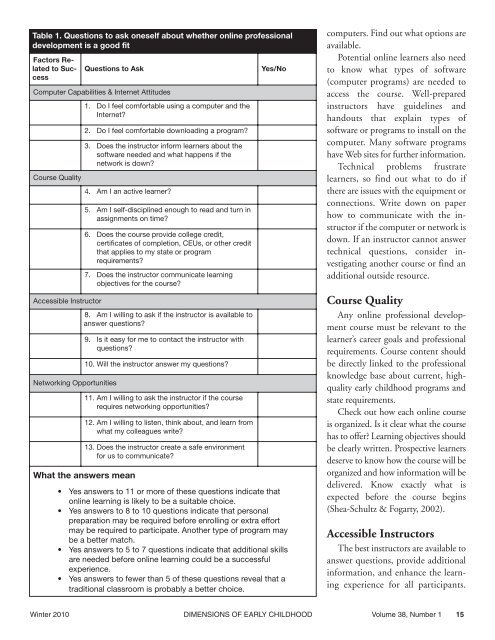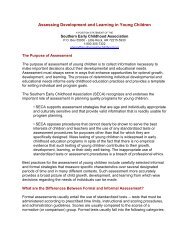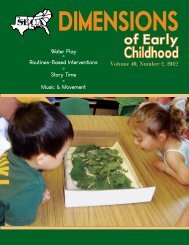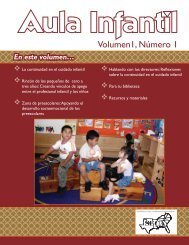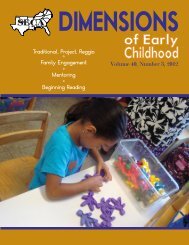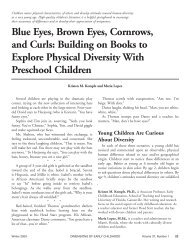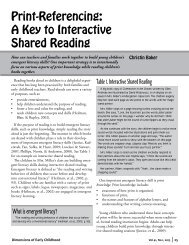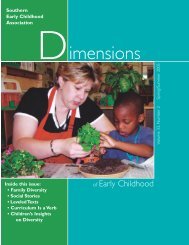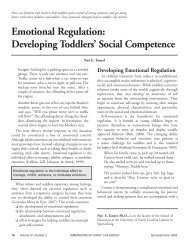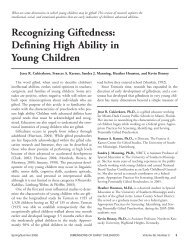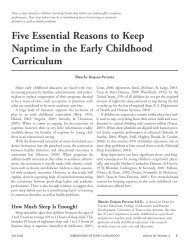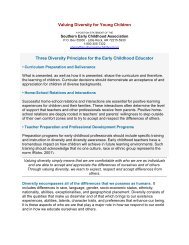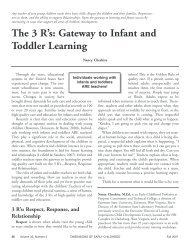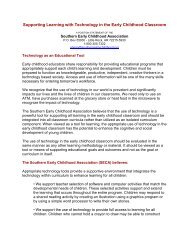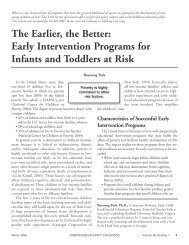90223 Dimensions Winter 10:Layout 1 - Southern Early Childhood ...
90223 Dimensions Winter 10:Layout 1 - Southern Early Childhood ...
90223 Dimensions Winter 10:Layout 1 - Southern Early Childhood ...
Create successful ePaper yourself
Turn your PDF publications into a flip-book with our unique Google optimized e-Paper software.
Table 1. Questions to ask oneself about whether online professional<br />
development is a good fit<br />
Factors Related<br />
to Success<br />
Questions to Ask<br />
Computer Capabilities & Internet Attitudes<br />
Course Quality<br />
Accessible Instructor<br />
Networking Opportunities<br />
1. Do I feel comfortable using a computer and the<br />
Internet?<br />
2. Do I feel comfortable downloading a program?<br />
3. Does the instructor inform learners about the<br />
software needed and what happens if the<br />
network is down?<br />
4. Am I an active learner?<br />
5. Am I self-disciplined enough to read and turn in<br />
assignments on time?<br />
6. Does the course provide college credit,<br />
certificates of completion, CEUs, or other credit<br />
that applies to my state or program<br />
requirements?<br />
7. Does the instructor communicate learning<br />
objectives for the course?<br />
8. Am I willing to ask if the instructor is available to<br />
answer questions?<br />
What the answers mean<br />
9. Is it easy for me to contact the instructor with<br />
questions?<br />
<strong>10</strong>. Will the instructor answer my questions?<br />
11. Am I willing to ask the instructor if the course<br />
requires networking opportunities?<br />
12. Am I willing to listen, think about, and learn from<br />
what my colleagues write?<br />
13. Does the instructor create a safe environment<br />
for us to communicate?<br />
Yes/No<br />
• Yes answers to 11 or more of these questions indicate that<br />
online learning is likely to be a suitable choice.<br />
• Yes answers to 8 to <strong>10</strong> questions indicate that personal<br />
preparation may be required before enrolling or extra effort<br />
may be required to participate. Another type of program may<br />
be a better match.<br />
• Yes answers to 5 to 7 questions indicate that additional skills<br />
are needed before online learning could be a successful<br />
experience.<br />
• Yes answers to fewer than 5 of these questions reveal that a<br />
traditional classroom is probably a better choice.<br />
computers. Find out what options are<br />
available.<br />
Potential online learners also need<br />
to know what types of software<br />
(computer programs) are needed to<br />
access the course. Well-prepared<br />
instructors have guidelines and<br />
handouts that explain types of<br />
software or programs to install on the<br />
computer. Many software programs<br />
have Web sites for further information.<br />
Technical problems frustrate<br />
learners, so find out what to do if<br />
there are issues with the equipment or<br />
connections. Write down on paper<br />
how to communicate with the instructor<br />
if the computer or network is<br />
down. If an instructor cannot answer<br />
technical questions, consider investigating<br />
another course or find an<br />
additional outside resource.<br />
Course Quality<br />
Any online professional development<br />
course must be relevant to the<br />
learner’s career goals and professional<br />
requirements. Course content should<br />
be directly linked to the professional<br />
knowledge base about current, highquality<br />
early childhood programs and<br />
state requirements.<br />
Check out how each online course<br />
is organized. Is it clear what the course<br />
has to offer? Learning objectives should<br />
be clearly written. Prospective learners<br />
deserve to know how the course will be<br />
organized and how information will be<br />
delivered. Know exactly what is<br />
expected before the course begins<br />
(Shea-Schultz & Fogarty, 2002).<br />
Accessible Instructors<br />
The best instructors are available to<br />
answer questions, provide additional<br />
information, and enhance the learning<br />
experience for all participants.<br />
<strong>Winter</strong> 20<strong>10</strong> DIMENSIONS OF EARLY CHILDHOOD Volume 38, Number 1 15


